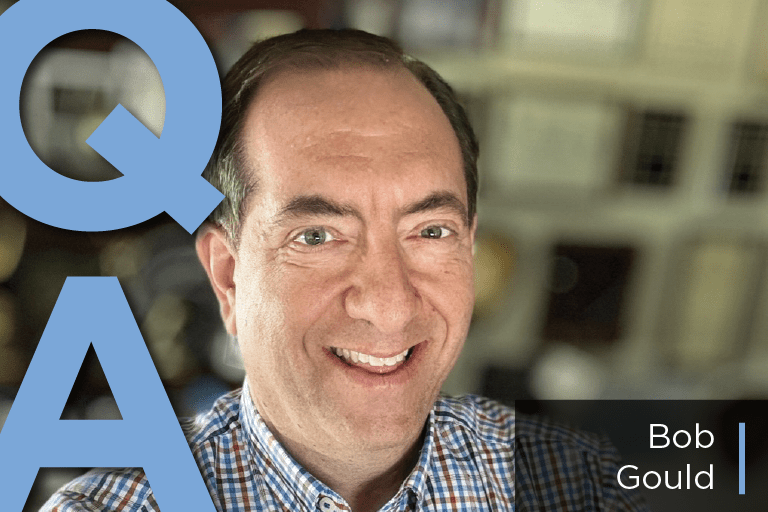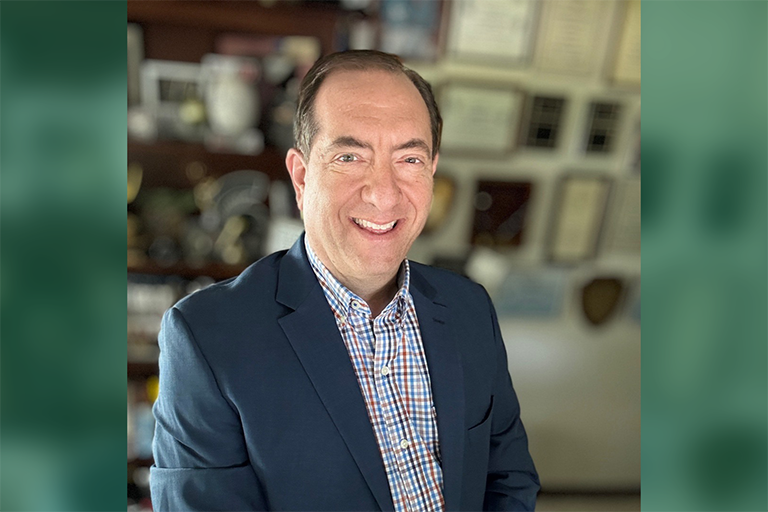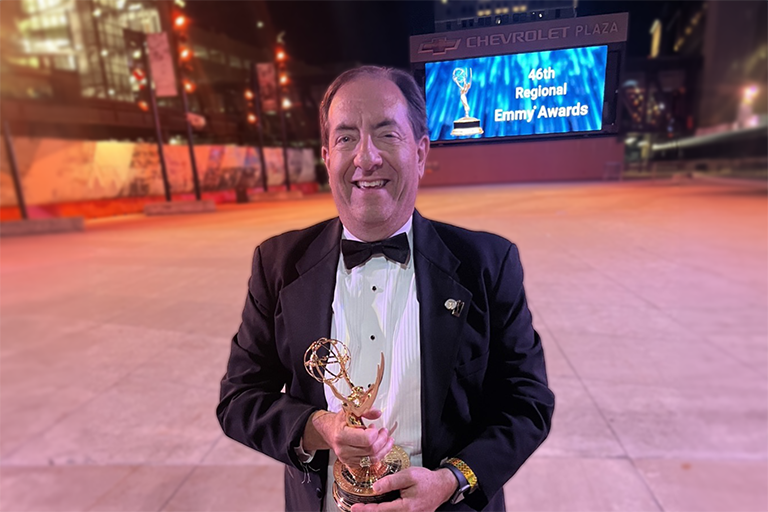Bob Gould, award-winning storyteller, educator and proud MSU alumnus, will be inducted into the Michigan Association of Broadcasters Hall of Fame, Aug. 13, 2024.
Bob Gould (’90, Telecommunication) has led an impressive career. As an esteemed figure in the world of broadcast journalism, Gould has dedicated more than three decades to the industry, seamlessly transitioning from a distinguished career in television news to a celebrated professor of practice at the MSU School of Journalism. Known for his exceptional visual storytelling, Gould has profoundly impacted the next generation of journalists while garnering numerous accolades along the way. In light of his upcoming Michigan Association of Broadcasters (MAB) Hall of Fame induction, Gould reflects on a career filled with memorable moments and significant contributions to journalism and education.
Q&A with Bob Gould
You have received numerous awards over the years. How does it feel to now be inducted to the Michigan Association of Broadcasters Hall of Fame?
It sounds cliche, but it’s truly an honor and I’m deeply humbled by it. As I looked at the list of who has been inducted before me, it’s hard to believe I’ll be listed among them. These are people I grew up watching on television, and to even be in the same conversation with them is exciting and extremely gratifying. It shows that broadcasters across the state are aware of my contributions to the craft, as well as my many years of success teaching students to become excellent visual storytellers and journalists.
The process to get into the Hall of Fame, as you can imagine, is not easy. A nomination packet is submitted by a colleague, with a resume, bio and letters of support from former students and colleagues I’ve worked with. The committee went over all the applications and then chose three candidates each in three different categories for a statewide ballot. Members of both MAB boards and former award winners then vote. They only chose one inductee from each category.
This is why this means so much to me.
A career like yours must be filled with stand-out moments, permanently etched into your memory. Which moments stand out most?
I’ve been fortunate to have some great successes in my career that I truly will never forget. I was never a very confident person growing up, so each time I had a breakout success to share, it was certainly a boost to my self-esteem.
- Getting my first job in TV News. It paid $5.50 an hour, but I didn’t care. I was about to have the coolest job ... going to places very few people had access to and meeting people with amazing stories to tell.
- My first awards for my work, including the first Emmy Award. I was nominated three or four times before I won, so it was a great night when they announced my name.
- Getting hired at MSU ... My dream job ... to teach at my alma mater, giving back the knowledge I had learned in my career. It’s been amazing to see students excel and learn.
- Winning the Edward L. Bliss award for outstanding education in broadcast journalism. This was a national award for teaching excellence, and this showed that not only was I a capable storyteller, but also my teaching peers and former students felt I am an outstanding educator.
- MAB Hall of Fame: The day I got the call about being inducted into the MAB Hall of Fame is a day I won’t soon forget.
- Going to Malawi, Africa to produce a documentary about children with malaria and the MSU doctor who relentlessly researches this disease. That was a life changing trip!
- Seeing my students win their first MAB student “Station of the Year” Award after years of getting close. I was so proud of that group. And now we’ve won six in a row.
What do you think is the most satisfying thing about being a journalist?
Many things stand out, but I honestly love telling stories and having audiences react to them. I love when a subject has a story to tell that resonates with viewers, in some emotional capacity ... whether it makes them laugh, cry, angry, or elicits any other emotion. Human emotion connects with viewers. I tell my students that stories are about people, not places or things ... it’s the experiences that people have in those places or with those things that better tell the story.
As a career video photojournalist and editor, creating beautiful images with meaningful audio are extremely satisfying, but for me, it’s the editing that really gets me excited. You start with a blank canvas and “paint” the images in a sequential fashion to create a visually appealing narrative. It really is art ... I’ve seen many stories with outstanding visuals that fall flat because of poor editing. The story doesn’t resonate overall.
What is your favorite thing about being an educator?
When I see students really “get” a concept ... When something clicks in their head, and I see improvement or that they’ve really understood how to do something ... Those are great moments for me as an educator. I teach beginning visual storytelling and I always marvel at the progress from the first day of class to the last day, 15 weeks later.
And then, when I teach seniors at the intermediate or advanced levels, seeing them getting jobs in a related field, using the skills we taught them, is really rewarding.
For instance, I keep a spreadsheet of former students working in TV related jobs and they are all over the country, working in markets like Detroit, L.A., New York, Philadelphia, D.C. ... and for networks like MSNBC, CNN and NBC. At recent count there are nearly 30 former students working TV jobs in Michigan in Detroit, Flint/Saginaw, Grand Rapids, and Cadillac/Traverse City.
I love it when students show their passion for learning and get excited when they grasp ideas and concepts ... and their storytelling really gets good.
What are some of the greatest challenges you’ve faced working in this field?
Journalism has really changed over the past 17 years since I started teaching. I must keep up with trends, innovative technologies and the struggles with credibility in journalism. The model is changing ... with news becoming less and less “appointment” TV viewing, we must find ways to still teach journalism that will engage younger audiences, while keeping the principles of journalism at the forefront. For me, I work hard on teaching these concepts, while weaving in the art of visual storytelling, because no matter how an audience will receive news — content, objectivity, fact-checking and story are still the most important.
Great stories tend to involve a mentor — someone guiding our hero, like Yoda and Luke, Mr. Miyagi and The Karate Kid … Who was/were your mentor(s), and what was the best advice you received from them?
I’ve had many over the years. When I was a young student at MSU, Bob Albers was my video and film professor. I learned so much from him about creating interesting visuals, stories and editing styles. I thought I would make films, documentaries and corporate videos but I ended up working in TV news. When I told Bob what I was doing he said something to the effect of, “News is fine, but ... It’s a lot of ‘run and gun,’ where the video can be sloppy.” I took that as a challenge ... to learn how to work in a fast-paced environment, but make my video always look like it was carefully crafted and not sloppy. This mentality helped me win many awards for my video over my career. Turns out I loved working in news and spent 17 years working in a local TV newsroom.
My other mentor is Al Tompkins, who led broadcast educational seminars at the Poynter Institute for many years, until his recent retirement. (Poynter is a place where journalists and educators can go for professional development.)
He’s a fantastic journalist, but an even better educator. I learned so much from him on how to be a visual storyteller, but more importantly, I have gotten so many teaching concepts from him. Much of my teaching philosophy is based on his style and ideas. I will forever be grateful for him because he is always available to talk and give advice whenever I need it.
What advice would you give your students (or any aspiring journalist) to succeed in this industry?
There are several things:
- Understand WHY we need journalists and how important the First Amendment is.
- Understand the role of journalists-telling stories that impact people, as well as giving a voice to the voiceless and holding the powerful accountable.
- Be a curious person. Look at the world around you. Ask questions to friends or strangers that will make you more informed. If I see someone wearing a cool shirt, I might ask them about the story behind it. Take a different route home or to work one day and keep your eyes and ears open for things that spike your curiosity.
- Don’t burn out too quickly. First markets are hard, but things get better. Don’t give up!
- Find a work-life balance. THIS IS SO IMPORTANT! Discover hobbies or things to do outside of work. Things that do not involve social media. I play the trumpet and I have recently joined a jazz band ... Rehearsals have become a highlight of my week, because I can take my mind off work and the outside world for a few hours.
- Find mentors in the business that will give you constructive criticism. Take the critiques seriously and grow from your mistakes/failures.
- For my students: seek help or advice from your professors and visit office hours. A little of that can go a long way.
- Lastly, work hard, learn new skills, and have fun!
Anything else you’d like to add?
Accolades and awards are great markers to show success, but work should not be based on trying to win awards. Hard work, patience and a good attitude will go a long way here, along with continually learning and reinventing yourself. Even though I am a teacher, I am a lifelong student. Understanding these concepts can often lead to recognition and that is when you know your hard work has paid off.
Lastly, I am extremely grateful for the people who have believed in me, especially those who helped induct me into the MAB Hall of Fame. Sometimes a Hall of Fame could mean that it is nearing the end of one’s career ... Don’t worry, as the band Chicago put it, it’s “only the beginning.”
— Jessica Mussell


